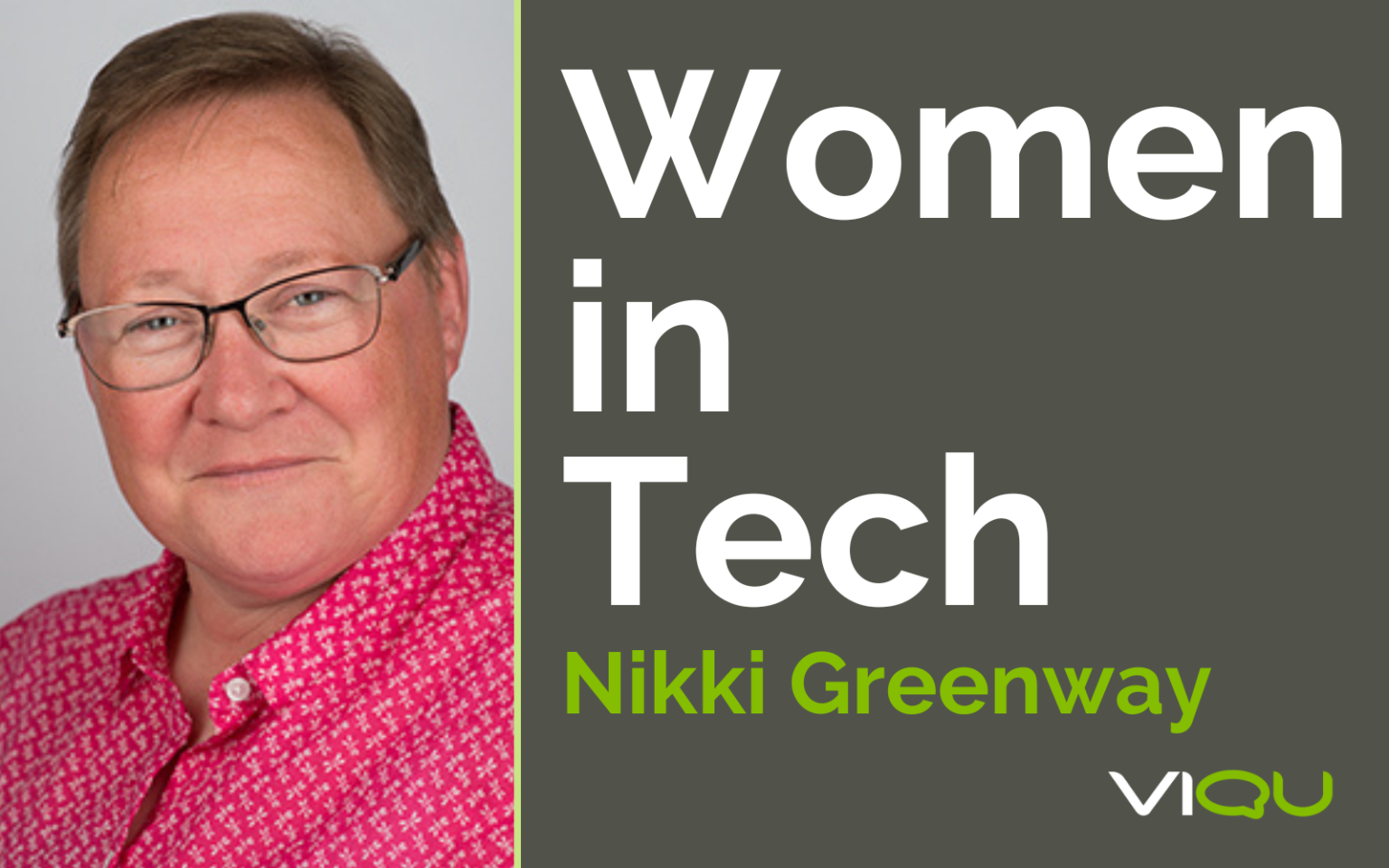Women In Tech: Q&A With Director Of Technology, Nikki Greenway

In my latest Women in Tech interview, The British Horse Society’s Director of Technology, Nikki Greenway shares her career journey from the education sector to IT.
In this interview, we discuss Nikki’s role and her responsibilities at Britain’s largest equestrian charity. We cover why Nikki is passionate about working in the charity sector and how a lack of representation isn’t stopping her from forging her own path!
Can you tell us about your current role and what your core responsibilities are?
My current role is Director of Technology for The British Horse Society. Within my job, I am responsible for not only setting the organisation’s digital transformation strategy, but also leading the technology team and our supply partners in delivering it. Of course, there’s also day-to-day work that comes with running an IT function.
Can you describe what a typical day looks like for you?
That is an interesting one because I would say that no two days are alike. But my days are generally a mix of dealing with messages from various stakeholders, drafting documents and presentations, and attending a wide variety of meetings. These can vary from one-to-ones to team meetings, project boards, discussions with suppliers, and chats with my counterparts at other organisations. And I have the privilege of sitting on the organisation’s executive committee too!
How did studying History and then Education lead to a career in technology?
I was supposed to do Computing and Management Science at university, but Keele did this thing called the ‘Foundation Year’… or as we all called it, the ‘Fun Year’! And in that year, I decided to switch. I originally wanted to mix History with Computing, but that combination wasn’t available, so I studied History and Politics instead.
I ended up working for an education non-departmental public body in London, studying for a Master’s in Education alongside my work. Luckily, I was there whilst they were starting to launch a few PCs around the place in advance of moving away from a Wang VS mainframe to distributed personal computers. I showed a bit of interest and that facilitated me in getting a caretaker role for six months, whilst the organisation was in a merger with another organisation.
Off the back of that, I managed to land a permanent role, looking after one of the disciplines within the IT department. Throughout my early years in IT, I not only did an MBA in Technology Management, but I also moved around each of the core disciplines to broaden my knowledge and understanding. That gave me a platform to springboard up to an overall Head of IT role and the rest is history.
Was that first role a sliding doors moment or did you already have a keen interest in pursuing a career in technology?
Technology has always been an interest of mine. I used to mess around on my parents’ home computer many, many years ago, doing a little bit of programming – that kind of thing. But at my school, if you were one of the more intelligent kids, you weren’t allowed near the computers because they expected us to go to university and not to meet a computer again until we started working life. It was thus a quirk of fate that resulted in an opportunity to work in the field.
Have your career moves always been planned or do you just move to roles that interest you?
Both! When I finished at Ofqual, I then went on to the Legal Ombudsman, another non-departmental public body, but this time in the justice sector. Therefore, I had a lot of transferable knowledge and experience from working in that same sort of governmental sector, but each being a little different in terms of focus.
I think it my experience within the justice sector that then helped me secure my role at Warwickshire Police, although, I found the police wasn’t a good cultural fit for me personally. So I then landed a contract working for a charitable body that eventually led to me securing the role I have today with The British Horse Society.
Are there any particular industries that you’ve enjoyed working in most, Nikki?
What I’m doing now; working in the charity sector! It’s absolutely fantastic. You can see the direct impact of what you’re doing.
You also get such passion and enthusiasm from people working at charities, and from the associated professionals who work with this sector. We’ve got this fantastic organisation called ‘Charity IT Leaders’ which is just full of people who are open, collaborative and willing to share. And I think that makes a really big difference in terms of what you can then achieve.
What is it about technology that has kept you engaged over the years?
I think the fact it’s changed significantly has been quite key. But I think for me personally, it’s seeing what you can do with technology to make a big difference in an organisation. The longer I’ve been in the game and the higher I’ve risen, the more it’s about trying to make a radical difference that actually underpins and supports the organisation’s strategy. And if you can see that and make that happen, that’s a very satisfying thing to do.
You’ve had an extensive and successful career in IT, do you still notice a lack of women working in technology?
Yes, there’s certainly a lack of women in the sector, particularly in what you might call ‘hard technical roles’ in areas like development and operations. But perhaps not so much in areas like business and project management, where I think the balance often tips in the other direction.
At senior levels, there is very much still a lack of women. Often, when I attend meetings with other senior folk, I am the only woman or one of just a few women there. And it’s not even just about gender, it’s about racial diversity too. I think you see a similarly disappointing sort of mix there at different levels and in a variety of tech roles.
Have you noticed any differences in the gender balance between the public and private sectors?
I would say that government and charity organisations tend to do better compared to what goes on in the private sector. I think there is a sense of social purpose that comes with the public sector and charities. So I think that makes a difference in those organisations feeling that they need to stay ahead of the curve on issues like diversity and inclusion. At least that’s my impression from discussions with my peers in both sectors.
But the tech industry as a whole is still lagging in terms of being representative of society.
Do you think the lack of women has changed either for the better or worse as your career has unfolded?
I’d love to say that the gender imbalance has improved numbers-wise, but I wouldn’t necessarily say that I feel that it has significantly. However, I would say that I’ve seen positive movement in terms of women and people from different ethnic minorities and backgrounds getting considered for opportunities and rising up the ranks, which is something that rarely used to happen.
But I think there are still too many young women not going into computing as a career or taking it as a subject in further and higher education. Too many seem to dismiss IT early on, so we’ve got a very small pool to start off with.
Do you have any opinions on why women are less attracted to IT?
I think it starts in the home. We have bizarre gender expectations that start from the minute a baby is born. Everything from the toys a baby is given, to the colours they are dressed in… there’s still a ‘you’re a girl, have a doll. You’re a boy, have a chemistry set’ attitude. It’s quite sad that children are pushed in particular directions because it’s in those formative years that personalities, attitudes, and interests begin to form.
I’d love to see that stereotyping change. It’s madness. But I think that it is still endemic in our society today.
Many women in IT feel that their gender has impacted the way they are perceived or treated at some point in their careers. Have you ever been in a situation like that?
I don’t really conform to gender expectations at all. I’ve certainly been bullied on account of my sexuality at work in the past, but more generally, I’ve often felt like I’m treated as an object of curiosity.
By now I’ve learnt to develop a very thick skin and not let other people’s reactions distract me from being unapologetically and authentically me.
What do you think businesses can do to encourage more girls and young women to consider careers in technology?
Businesses need to link up with schools, colleges, and universities to do their bit. This is probably more suitable for larger organisations, but they can attend career events and offer work experience, sandwich placements, and even apprenticeships. Businesses should not positively discriminate, but they should take positive action. A business could actively seek to support a local girls’ school or schools with high percentages of students from low socioeconomic status households.
Additionally, I think there is a lot of opportunity for companies to upskill existing team members for IT roles that don’t require deep knowledge. Frankly, that kind of knowledge is probably a barrier in some cases. For instance, in the project management world, it’s far more important that you have well-honed organisational skills than an extensive knowledge of IT. So organisations should be building their own pipeline of talent by making people in alternative areas of the business aware that they have transferrable skills that correlate with a career in IT. Doing things like ‘A Day in My Shoes’ sort of events (as we do in the BHS) can really help.
I think the other key thing that all organisations need to be doing is to make sure that when they welcome women who are new to technology, they should not only make sure they have access to the right training and education, but that they’ve got a great mentor too. Without investing in them and supporting them through that massive transitional time, these women are not going to stay in IT for the long-term.
Which moment in your career would you say you’re particularly proud of Nikki?
There are two that stick out for me.
The first one was during my time at Ofqual. It was my first Head of role. There was a challenge regarding the organisation de-merging from another organisation to form this new non-ministerial government department. So it involved not only creating and setting up all the technology and transferring the necessary information across, but also creating an operational function and getting processes in place to give a really good quality of service. We had to turn that around in six months and it was just myself, one other full-time employee, and a couple of contractors. It was high pressure but a great achievement.
The second was whilst I was with the Legal Ombudsman. I led the transformation of all their services into the cloud. That included a particularly sticky situation with a poorly built business-critical solution. It was pretty much the core of the organisation, and when I arrived there, it was going down three times a day. So again, it was about efficiency. In certain areas of the business, the transformation resulted in 40% efficiency gained. It was really impactful in terms of the business getting a grip on itself and moving forward.
Do you have any role models?
If I’m being honest, there aren’t many women like me in the world at all, let alone in positions of leadership. So, I tend to see myself as forging my own path. It’s just how you have to be when you don’t see anybody around who looks much like you.
Is there one piece of advice that you wish someone had given you at the beginning of your career in technology?
Know yourself. Be yourself. Find the right place for yourself.
Thank you for checking out our latest interview in our Women in Tech series – you can access more interviews from the series here.
Please click here to get in touch if you are looking for talented individuals to join your tech team!
Similar articles you might like...

In The Age Of Artificial Intelligence, Why Are Businesses Prioritising Female Decision-Makers?
It has been found that employing women in AI teams and leadership positions is strategically important for tech businesses as AI grows in popularity.

Q&A With Currys’ Women In Tech: Part 2
In the final half of this Q&A with Philippa, Nia and Diane from Currys, they discuss what businesses should be doing to attract more women into tech, and the advice they'd give to individuals looking to explore careers in technology.
Latest jobs
IT Risk & Controls Lead
 London, United Kingdom
London, United Kingdom
 £55k - 63k per year
£55k - 63k per year
IT Risk & Controls LeadLondon – Hybrid (2 DPM in office)Up to £63,000VIQU have partnered with a leading organisation who are seeking an IT Risk & Controls Lead to join their IT risk management team.The...
Site Supervisor
 Stone, United Kingdom
Stone, United Kingdom
 Market Related
Market Related
Job Title: Site Supervisor Location: Stone (on-site)- must have full UK Driving License. Salary: market- relatedVIQU has partnered with a top engineering company seeking a Site Supervisor to create and manage project plans. The...
Installation Co-Ordinator
 Winchester, United Kingdom
Winchester, United Kingdom
 £250 - 350 per day
£250 - 350 per day
Installation Co-Ordinator – 3-month contract – Hampshire My customer is looking for a proactive and organised Installations Co-Ordinator to manage and support the installation of IT products and services across their trade and supply locations....
Network and Security Specialist
 London, United Kingdom
London, United Kingdom
 Market related
Market related
Network and Security SpecialistLondon – Hybrid (4 days weekly in office)Competitive Salary + Car allowanceVIQU have partnered with a prestigious Fortune 500 company that is looking to hire a Network and Security Specialist. The Network...
Financial Accountant
 Stone, United Kingdom
Stone, United Kingdom
 Market related
Market related
Financial AccountantStone - HybridCompetitive SalaryVIQU have partnered with a leading entity in operational technology and digital transformation. Operating in highly regulated and demanding industrial sectors, they have successfully executed pivotal projects across energy, nuclear, renewables,...

